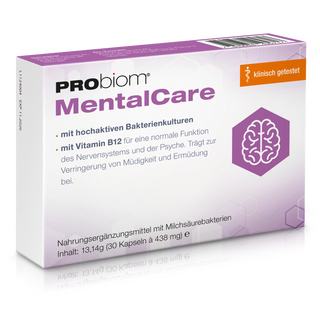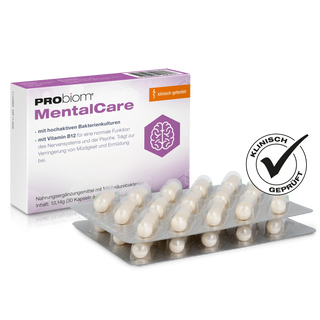Good sleep isn't a luxury, but a necessity. Yet millions of people struggle to get truly restful sleep night after night. The causes are varied: stress, digital sensory overload, poor diet, or hormonal imbalances. In this article, we'll show you how to sleep better, which scientifically proven methods can help you, and why probiotics may play an underestimated role.
Why is sleep so important?
Sleep is an essential phase of regeneration for body and mind. While we sleep, highly complex processes take place in the background: cell repair, memory consolidation, hormone regulation, and immune strengthening. Those who consistently lack sleep risk not only chronic exhaustion but also serious health problems such as high blood pressure, depression, diabetes, or cardiovascular disease.
Causes of poor sleep
Sleep quality can be influenced by many factors, including:
-
Psychological stress such as anxiety, worry or stress
-
Too much screen time before bedtime
-
Unfavorable sleeping environment (e.g. light, noise, temperature)
-
Consumption of alcohol or caffeinated drinks in the evening
-
Hormonal imbalances, especially in women
-
Digestive problems or an unbalanced gut
The last point in particular is becoming more and more of a focus in sleep research.
The gut-sleep connection
The gut is often referred to as the "second brain." And not without reason: A healthy gut directly influences our central nervous system via the enteric nervous system and the gut-brain axis. The trillions of microorganisms in our gut (the so-called microbiome) play a central role in this.
Recent studies show that a balanced microbiome can influence the production of sleep hormones such as serotonin and melatonin. Serotonin is a feel-good hormone that promotes mood and drive during the day and contributes to the production of melatonin, the actual "sleep hormone," at night.
If your gut is out of balance – due to stress, medication, poor diet or infections, for example – this can significantly affect the quality of your sleep.
Probiotics as natural sleep aids
Probiotics are live microorganisms that help the gut maintain a healthy balance. They occur naturally in fermented foods such as yogurt, kefir, sauerkraut, or kimchi, but are also available in supplement form.
Research suggests that certain probiotic strains can have a positive impact on sleep. This occurs on several levels:
-
Improvement of the intestinal barrier and reduction of inflammatory processes
-
Increase the production of GABA, a calming neurotransmitter
-
Strengthening stress resistance through better cortisol regulation
-
Indirect promotion of melatonin production
Studies with the tribes Lactobacillus helveticus Rosell®-52 and Bifidobacterium longum Rosell®-175, for example, showed a reduction in stress-related sleep disturbances and an improvement in overall sleep efficiency.
Sleep hygiene: The basis for good sleep
While probiotics can be a promising supplement, solid sleep hygiene is a prerequisite for better sleep. Pay attention to the following aspects:
Regularity: Go to bed and wake up at the same time every day – even on weekends. This allows your body clock to adjust optimally.
Optimize your sleeping environment. Your bedroom should be dark, quiet, and cool. A room temperature between 16 and 18 degrees Celsius is ideal.
Digital detox: Avoid screen time at least one hour before bedtime. Blue light inhibits melatonin production.
Develop an evening routine Rituals such as reading, a warm bath or meditation signal to your body that it is time to sleep.
Pay attention to your diet. Avoid heavy meals, alcohol, and caffeine in the hours before bedtime. Instead, opt for calming teas or a small, protein-rich snack.
Natural aids for better sleep
In addition to probiotics, there are other natural ways to improve your sleep:
Herbal remedies : Valerian, passionflower, lavender or lemon balm have proven to be natural sleep aids.
Magnesium : This mineral has a relaxing effect on muscles and nerves. It is particularly helpful for inner restlessness.
CBD (Cannabidiol) : This non-psychoactive hemp extract can help reduce stress and improve sleep quality.
Light therapy : Especially in dark months, targeted light supply can help regulate the sleep-wake rhythm.
The influence of movement and daylight
Exercise is a real sleep booster—but only at the right time. Regular exercise in the morning or early afternoon helps burn off excess energy and improve sleep architecture. However, avoid intense workouts close to bedtime.
Natural daylight is equally important. It helps your body release melatonin and cortisol in a natural rhythm. Even a morning walk can work wonders.
Mental techniques: Calming your mind
Many sleep problems originate in the mind. Worries, circling thoughts, or to-do lists prevent you from switching off. Mental strategies can help here:
Breathing exercises : Deep, conscious breathing activates the parasympathetic nervous system and promotes relaxation.
Progressive muscle relaxation : By consciously tensing and relaxing individual muscle groups, the stress level decreases.
Meditation and mindfulness : If practiced regularly, they help you let go of thoughts and fall asleep faster.
Writing a diary : Writing down thoughts in the evening reduces mental stress and creates space for relaxation.
Conclusion: Sleeping better is possible
Poor sleep isn't a fate. With a better understanding of the connections between lifestyle, mind, body, and gut health, you can actively influence it. Probiotics offer promising, natural support for more rest, balance, and quality of sleep.
If you approach your sleep problems holistically – from sleep hygiene to mental techniques to targeted support for your gut – you will soon feel the difference not only at night but also during the day.













